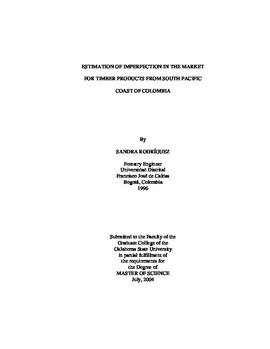| dc.contributor.advisor | Lewis, David K. | |
| dc.contributor.author | Rodriguez, Sandra | |
| dc.date.accessioned | 2014-04-15T21:59:59Z | |
| dc.date.available | 2014-04-15T21:59:59Z | |
| dc.date.issued | 2004-07-01 | |
| dc.identifier.uri | https://hdl.handle.net/11244/9193 | |
| dc.description.abstract | Timber markets play an important role in the communication of society's preference regarding the sustainable utilization of forest and the equitable distribution of benefits. However, the preferences of societies may be distorted because of imperfections in markets. The objective of this research is to estimate the degree and nature of imperfections in the markets for forest products from the South Pacific region of Colombia. This objective is achieved through a description of the structure of timber market, and an examination of behavior of the participants in the market. This effort will include the establishment of relationships between the performance of these markets and the contribution of the forest products sector to the achievement of National economic goals. An econometric analysis was undertaken of selected market to numerically estimate the degree of the imperfection. The description of the markets indicates high levels of seller concentration. There are high barriers to entry in the markets associated with knowledge requirements, high levels of available capital, vertical integration, lack of institutions and deficient banking system. As a consequence markets are imperfect. Imperfect markets deviates the best possible contribution to the economic well being of the citizens, particularly for the communities living in the forest. High levels of unequal income distribution, unemployment and poverty characterized the South Pacific region. The low contribution of the timber industry to achieve economic and social goals has negative impact in the conservation of the forest. The econometric model for market wholesalers-concentration yard indicates a fairly high estimate of oligopoly power which is consistent with the description of the markets. | |
| dc.format | application/pdf | |
| dc.language | en_US | |
| dc.publisher | Oklahoma State University | |
| dc.rights | Copyright is held by the author who has granted the Oklahoma State University Library the non-exclusive right to share this material in its institutional repository. Contact Digital Library Services at lib-dls@okstate.edu or 405-744-9161 for the permission policy on the use, reproduction or distribution of this material. | |
| dc.title | Oklahoma Community Nutrition Education Program Participant's Diet Quality Does Not Differ By Food Security Status | |
| dc.type | text | |
| dc.contributor.committeeMember | Lynch, Thomas B. | |
| dc.contributor.committeeMember | Adam, Brian D. | |
| dc.contributor.committeeMember | Stoecker, Arthur L. | |
| osu.filename | Rodriguez_okstate_0664M_1031.pdf | |
| osu.college | Agricultural Sciences and Natural Resources | |
| osu.accesstype | Open Access | |
| dc.description.department | Department of Natural Resource Ecology and Management | |
| dc.type.genre | Thesis | |
| dc.subject.keywords | timber markets | |
| dc.subject.keywords | market imperfections | |
| dc.subject.keywords | oligopoly | |
| dc.subject.keywords | colombia | |
| dc.subject.keywords | market structure | |
